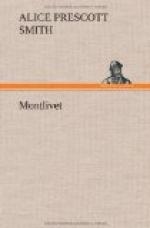Sometimes the Power that rules us, and that shoves us here and there to play our parts in the game, seems to me nothing but a cold-eyed justice, remote, indifferent, impartially judicial. So I felt now. In looking at the issue I saw that meaning and vitality had gone from my spirit, but I had kept equity. I parceled the spoil among the tribes, and did it without doubt of my judgment or care for its acceptance. I remembered Outchipouac’s plea for his people, and found it just. The Malhominis had sent the largest force in proportion to the strength of their tribe, and their position on the bay was strategical. So I gave them their choice of a third of the captives. To the remaining tribes I gave the rest of the captives and the confiscated weapons. Then I passed the calumet among them.
I had spoken coldly, as an onlooker. Perhaps my air of detachment gave me authority. The chiefs smoked the calumet and ratified my words. That part of the council was over.
And then to the future. Cadillac rose. His eloquence painted the prospect till it shimmered like a dream landscape, rose-tinted, iridescent, with sparkling vistas full of music and bugle calls and the tramp of marching men with the sun in their faces. We, French and Indians, were a united people. Our young men were brave and full of vigor. We should sweep all before us. We should crush the Iroquois and drive the English far away over seas. We should go now to Michillimackinac and march from there to conquest and empire. All the bubble dreams of sovereignty, from Nineveh on, glittered in his words. I translated faithfully.
Outchipouac answered. I had somehow won his spirit, which was brave and vigorous. Perhaps he repented his distrust of me. My silver chain was on his neck, and he fingered it. He said that where I led the Malhominis would follow. His wild imagery swept like the torrent of an epic. The man was warrior, dreamer, fatalist. He called on the chiefs of the tribes to witness what I was, what I had done. Water could not drown me, arrows could not harm me. I wore the French garb and my face was white, but I was something more universal than any race. I spoke all tongues. I was like the air which belonged to French and Indian alike. I was a manitou; I had been sent to lead the Indians back to the supremacy that they had almost lost.
I could believe him as I listened. I did not remember that he spoke of me. He was talking of some great principle, some crystallization of the forces of the woods in man’s shape. The woods that had nurtured the Indian should protect him. At last, out from the woods had come this spirit,—this spirit that was their voice. He did not talk to me, he talked to the skies and the clouds and the forces that dwelt in them. It was the call of a savage king to the soul of the wild earth that had cradled him.
So swept away was I that I could not have translated. But it was not necessary. He had spoken in Algonquin, which all but the French and Hurons understood. The war chiefs rose. It is strange. An Indian may scalp and torture, yet have at heart much of the seer and poet. The chiefs came forward and laid their bows and quivers full of arrows at my feet.




